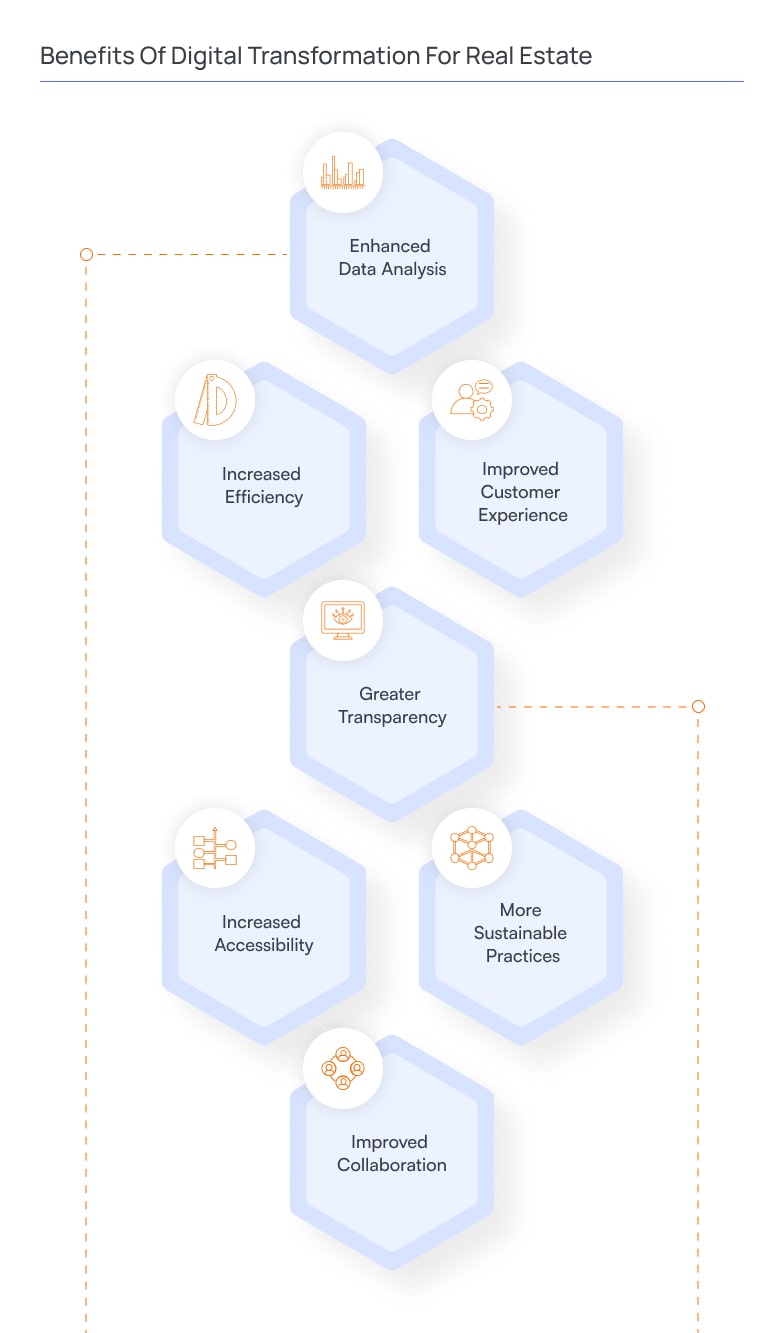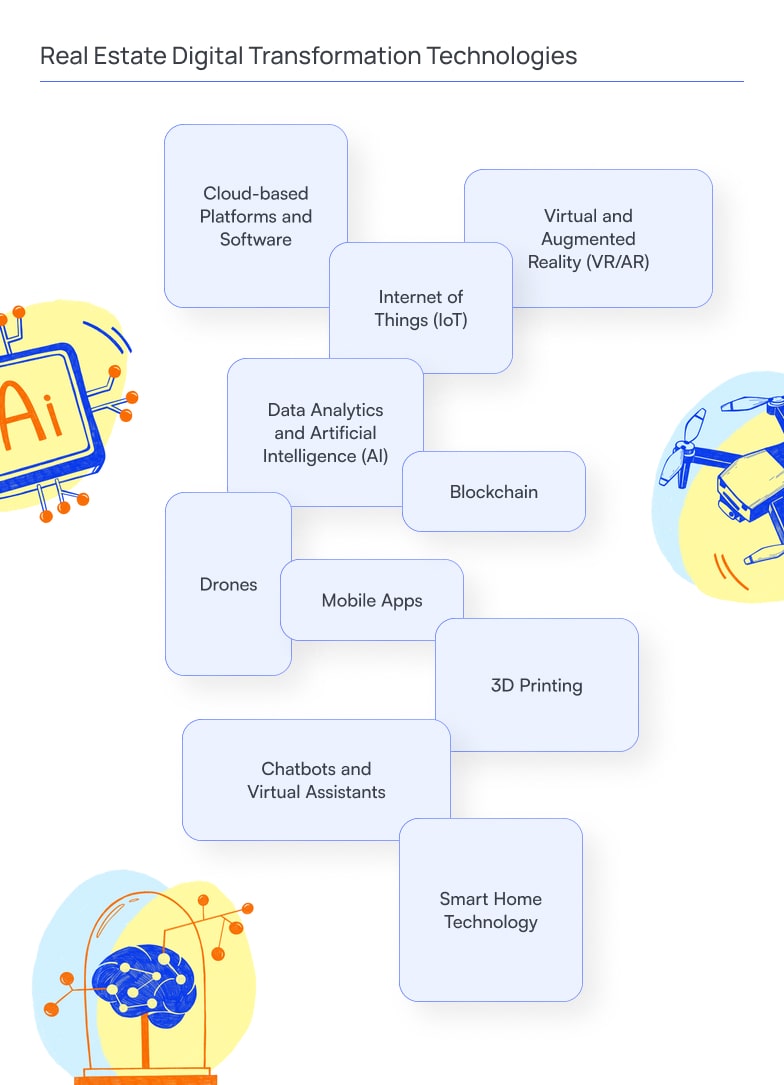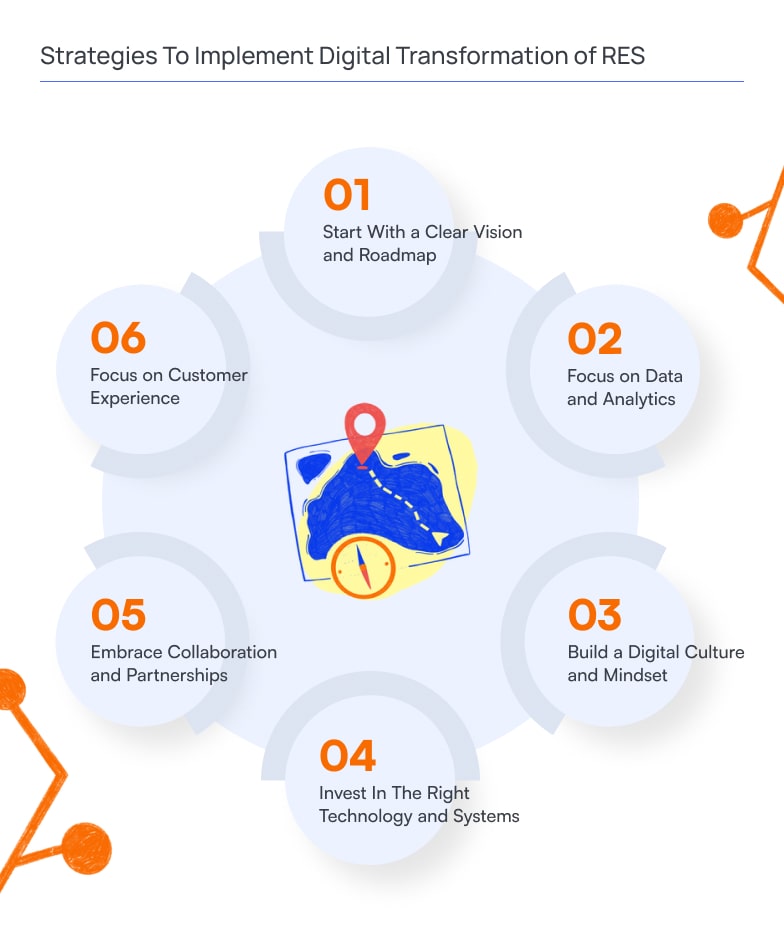Digital transformation is rapidly changing industries across the board, and real estate is no exception. Digital technologies and data analytics are transforming how real estate is bought, sold, managed, and developed. From smart buildings and energy efficiency to virtual reality and blockchain, real estate companies embrace digital transformation to stay competitive and meet customers’ evolving needs.
Today we will explore the key drivers, benefits, challenges, and strategies of digital transformation in real estate and the top digital technologies transforming the industry. Whether you are a real estate professional or simply interested in the industry’s future, this article will provide valuable insights into the impact of digital transformation on real estate.
What is Real Estate Digital Transformation?
Digital transformation in real estate refers to using technology and digital tools to modernize and optimize the various functions and processes within the real estate industry. It includes using data analytics, automation, and other digital technologies to improve operations, enhance the customer experience, increase efficiency, reduce costs. It also enables innovation in areas such as construction, property management, sales and marketing, and more.
Digital transformation in real estate has the potential to revolutionize the industry, driving growth and competitiveness while delivering significant benefits for industry players and consumers alike.
Key Drivers Of Digital Transformation In Real Estate Industry
There are three main drivers we consider necessary to mention. They are the following:
- Changing consumer expectations and behavior
- Advancements in technology and data analytics
- Increasing demand for sustainability and energy efficiency
Changing Consumer Expectations and Behavior
Changing consumer expectations and behavior are one of the key drivers of digital transformation in real estate. Today’s consumers have become increasingly tech-savvy and expect seamless, digital experiences across all aspects of their lives. It has led to a growing demand for digital tools and platforms that enable more convenient and efficient property search, viewing, and transaction processes in the real estate industry.
Consumers are looking for instant access to property information and real-time updates on property availability. They want to be able to browse properties online and view high-quality virtual tours, videos, and images before physically visiting a property. They also expect easy and secure online transactions and digital document signing rather than the traditional, time-consuming paper-based processes.
As a result, real estate companies are investing heavily in digital platforms and technologies to meet these changing consumer expectations and remain competitive. These include online marketplaces, mobile apps, virtual and augmented reality tools, and digital document management systems. By leveraging these technologies, real estate companies can provide a more convenient and streamlined customer experience, resulting in higher customer satisfaction and loyalty.
Advancements In Technology and Data Analytics
Advancements in technology and data analytics are another key driver of digital transformation in real estate. The rapid pace of technological innovation has led to new tools and platforms that enable real estate companies to optimize their operations and services.
One of the most significant advancements has been the rise of the Internet of Things (IoT), which has enabled the creation of smart buildings and cities. IoT devices, such as sensors and automation systems, can collect and transmit data on everything from energy usage to occupancy rates, allowing real estate companies to make data-driven decisions and optimize their buildings’ performance and efficiency.
Artificial intelligence (AI) and machine learning (ML) have become increasingly prevalent in the real estate industry. These technologies can analyze large amounts of data and identify trends and patterns that would be difficult or impossible to detect manually. It can help real estate companies make more informed decisions about everything from property valuation to marketing strategies.
Technological advancements and data analytics enable real estate companies to operate more efficiently, reduce costs, and make more informed decisions. By leveraging these tools and platforms, they can stay ahead of the competition and deliver better value to their customers.
Increasing Sustainability and Energy Efficiency
Increasing sustainability and energy efficiency are another key driver of the digital transformation of real estate. With the rise of green building practices and a growing focus on sustainability, there is a need for real estate companies to adopt digital technologies that enable more efficient and sustainable operations.
One such technology is smart energy management systems, which use sensors and automation to monitor and control a building’s energy usage in real-time. These systems can optimize energy consumption, reduce waste, and lower utility bills for building owners and tenants.
Another technology is green building design software, which can model and simulate a building’s energy performance and environmental impact. It allows real estate companies to identify and implement design strategies that minimize energy consumption and maximize sustainability.
Finally, renewable energy sources such as solar and wind power are becoming increasingly popular in the real estate industry. Digital technologies such as energy storage systems and microgrids can help to optimize the integration and use of renewable energy sources, further reducing a building’s carbon footprint.
Benefits Of Digital Transformation For Real Estate
If you plan to start the digital transformation process in the real estate business, you should know the advantages and why you should make it.

Enhanced Data Analysis
One of the primary real estate digital transformation benefits is the ability to collect and analyze large amounts of data. By leveraging data analytics, real estate companies can gain insights into customer behavior, market trends, and property performance, allowing them to
make more informed decisions and gain a competitive advantage.
Increased Efficiency
Digital technologies can automate manual processes, reducing the time and resources required for property management, maintenance scheduling, and rent collection. This increased efficiency allows real estate companies to focus on higher-value tasks and improve overall productivity.
Improved Customer Experience
Digital technologies can enhance the customer experience by providing more personalized, convenient, and efficient services. For example, virtual property tours and online applications can make the property search and leasing process faster and easier for customers, increasing customer satisfaction and retention. Real estate app development is necessary to take your business to the next level and stay ahead of the competition.
Greater Transparency
Digital technologies can provide greater transparency in the real estate transaction process, improving trust and reducing the risk of fraud. For example, blockchain technology can create secure and transparent property ownership records, reducing the risk of disputes and facilitating faster and more efficient transactions.
Increased Accessibility
Digital technologies can improve accessibility to real estate services for customers with disabilities, such as those who are visually impaired or have mobility issues. For example, 3D printing technology can create tactile models of properties, allowing visually impaired customers to understand property layouts and features more quickly.
More Sustainable Practices
Digital technologies can help real estate companies adopt more sustainable practices, reducing their environmental impact and improving customer reputation. For example, above mentioned smart building technology can be used to optimize energy usage, reducing costs and carbon emissions.
Improved Collaboration
Digital technologies can facilitate collaboration between real estate professionals, allowing them to share information and work more efficiently. For example, cloud-based platforms can store and share property information and documents, allowing multiple stakeholders to access data from anywhere and collaborate more effectively.
Top Commercial Real Estate Digital Transformation Technologies
There is a range of real estate and technology trends that will make your software up-to-date and enhance it with hi-tech features. We will list the top 10 technologies.

Cloud-based Platforms and Software
Cloud-based platforms and software can enable real estate companies to access and manage data and applications from anywhere, improving collaboration and productivity. It can include property management software, customer relationship management (CRM) systems, and other tools. Some popular cloud-based platforms and software for real estate include Salesforce, Yardi, and CoStar.
Internet of Things (IoT)
IoT devices such as sensors, automation systems, and smart appliances can collect and transmit data on everything from energy usage to occupancy rates, enabling real estate companies to make data-driven decisions and optimize their operations. For example, IoT sensors can track foot traffic in a retail space, helping real estate companies to make informed decisions about leasing and pricing. IoT platforms like BuildingIQ and Enlighted offer solutions for real estate companies looking to leverage IoT technology.
Data Analytics and Artificial Intelligence (AI)
Data analytics and AI can help real estate companies analyze large amounts of data and identify trends and patterns that would be difficult or impossible to detect manually. This can inform decision-making in property valuation, marketing strategies, and risk management. Real estate companies can leverage AI-powered tools like Zillow’s Zestimate algorithm, which uses machine learning to estimate the value of a property based on various data points.
Virtual and Augmented Reality (VR/AR)
Virtual and augmented reality tools can provide a more immersive and engaging customer experience, enabling real estate companies to showcase properties and spaces dynamically and interactively.
For example, real estate companies can use VR to create virtual tours of properties, allowing potential buyers and tenants to explore areas remotely. Popular VR/AR platforms for real estate include Matterport and REinVR.
Blockchain
Blockchain technology can offer real estate companies a secure and transparent way to manage transactions and property ownership. Using blockchain allows real estate companies to eliminate the need for intermediaries such as banks and lawyers, reducing costs and increasing efficiency. For example, blockchain-based platforms like Propy enable real estate transactions to be completed entirely online.
Drones
Drones can provide real estate companies with a bird’s-eye view of properties and surrounding areas, allowing them to make informed property development and management decisions. For example, real estate companies can use drones to inspect roofs and other hard-to-reach areas and gather data on traffic and foot traffic in surrounding areas.
Mobile Apps
Mobile apps can provide real estate companies with a convenient and accessible way to connect with customers and manage their operations. For example, real estate companies can use mobile apps to showcase properties, track leads, and manage payments. Popular mobile apps for real estate include Zillow, Redfin, and Trulia.
3D Printing
3D printing can offer real estate companies a cost-effective way to create models and prototypes of buildings and structures. It can enable real estate companies to test designs and ideas before committing to full-scale construction. For example, real estate companies can use 3D printing to create scale models of buildings and neighborhoods.
Chatbots and Virtual Assistants
Chatbots and virtual assistants can provide real estate companies with a way to automate customer interactions and improve customer service. For example, real estate companies can use chatbots to answer common questions and provide information about properties. Popular chatbot and virtual assistant platforms for real estate include OJO Labs and Avaamo.
Smart Home Technology
Smart home technology can offer real estate companies a way to differentiate their properties and provide added value to tenants and buyers. For example, real estate companies can equip properties with smart thermostats, lighting, and security systems, enabling tenants and buyers to control their environment from their mobile devices.
Stay caught up in the competition. Start your digital transformation journey today. Binerals will help you
Contact usKey Strategies To Implement Digital Transformation of Real Estate Sector
If you want to start digital transformation wisely, we highly recommend you follow specific strategies, and here they are.

Start With a Clear Vision and Roadmap
Starting with a clear vision and roadmap is critical for any successful digital transformation initiative in the real estate industry.
Before embarking on any digital transformation project, real estate companies should clearly understand their goals and objectives and plan for how to achieve them.
It involves taking a step back and looking at the bigger picture, including the company’s overall strategy and how digital technologies can support and enhance it. It also involves identifying the specific pain points and challenges the company faces and how digital technologies can help address them.
Focus on Data and Analytics
Data and analytics play a crucial role in the success of digital transformation in real estate. By leveraging data and analytics, companies can gain insights into customer behavior, property trends, and market conditions, enabling them to make informed decisions and optimize their operations. Companies can use predictive analytics to forecast trends and identify opportunities or risks. Predictive analytics can help real estate companies make informed investment decisions, pricing, and property development decisions.
Furthermore, real-time analytics allows companies to monitor and track performance metrics in real-time, enabling them to quickly identify and respond to issues.
Build a Digital Culture and Mindset
Real estate companies should foster a culture of innovation and agility, encouraging employees to embrace new digital technologies and approaches. Digital transformation initiatives must start from the top. Leaders must be committed to the transformation process and willing to invest time, money, and resources.
Also, real estate companies should encourage collaboration between departments, allowing for the free flow of ideas and information.
Invest In The Right Technology and Systems
Real estate companies should carefully evaluate and invest in the technology and systems best suited to their needs, whether cloud-based platforms, IoT devices, data analytics, AI tools, or virtual and augmented reality. Real estate companies can improve efficiency, productivity, and profitability by investing in the right technology and systems and providing better customer service.
Embrace Collaboration and Partnerships
Real estate companies should consider partnering with other companies, startups, or technology providers to access innovative technologies, expertise, and resources.
For example, real estate companies can co-create solutions with their customers and tenants, gaining insights into their needs and preferences and improving their overall customer experience. In addition, companies can form strategic partnerships with technology providers, enabling them to leverage their expertise and resources to develop and implement new digital solutions.
Focus on Customer Experience
The shift towards digital technologies has enabled customers to interact with real estate companies through various channels, such as websites, social media, and mobile apps. As a result, companies need to focus on providing an exceptional customer experience across all channels. Real estate businesses should personalize their customer experience by leveraging customer data to tailor their services to their customer’s specific needs and preferences.
Also, there should be an omnichannel experience, ensuring customers can seamlessly transition from one channel to another without disruptions.
Challenges of Digital Transformation In Commercial Real Estate
Digital transformation in real estate can bring many benefits, but several challenges and considerations must be addressed. Here are some key challenges and concerns:
Resistance to change. One of the biggest challenges of digital transformation in real estate is the resistance to change from employees and stakeholders. Many employees may be used to traditional processes and hesitant to adopt new technologies and workflows.
Data privacy and security. Real estate companies must ensure that sensitive data, such as personal and financial data, is secure and protected from cyber threats.
Integration of legacy systems. Real estate companies may have legacy systems incompatible with new digital technologies. It can lead to difficulties integrating new and existing systems and data.
Cost. Implementing new technologies and techniques can be expensive, and real estate companies must carefully consider digital transformation’s cost-benefit.
Standardization. Standardization of data and systems is vital for effective digital transformation in real estate. Real estate companies must ensure their data is consistent and standardized across all systems and platforms.
Regulatory compliance. Real estate companies must comply with various regulations, such as data protection laws and building codes. Digital transformation can bring new compliance challenges, and real estate companies need to ensure they meet all regulatory requirements.
Drawing the Line
Digital transformation plays a crucial role in the success of the real estate industry. This fact is integral. Companies that adopt digital technologies and strategies can gain a competitive advantage, improve operational efficiency, and enhance customer experience. However, digital transformation requires a strategic approach and a commitment to change.
Companies must invest in the right technology, build a digital culture, focus on data and analytics, embrace collaboration, and prioritize customer experience. By doing so, companies can unlock the full potential of digital transformation, and the real estate business will thrive. So, don’t hesitate to embark on your digital transformation journey and leverage the latest technological advancements to transform your real estate business.
Looking for a trusted software development partner for your real estate business? Contact Binerals to discuss your project and explore potential solutions.
Contact us